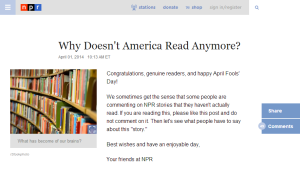
I’m never quite sure what to think of National Public Radio (NPR). Their non-political news and feature coverage is top-notch, so they do find themselves in my rotation for that reason, but their political coverage has been some of the most slanted you can find. I’m told that this has improved somewhat in the last year or two, but it used to be so bad that I could hardly listen to or read their political news for five minutes without being overwhelmed by inaccuracies and opinions being presented as fact. Don’t get me wrong; I don’t mind reading or listening to left-wing political opinion. In fact I make a conscious effort to expose myself to opinions from across the spectrum. You might be surprised to find that my NewsBlur feed reader brings me articles from the Daily Kos and the Huffington Post, among many other other political opinion sites from the right, left, and center.
But the sources I like best are the ones that are honest about what they are giving me: opinions. I don’t like it when partisan political opinions are presented as if they are dry, unbiased news. For this reason, I tend to avoid the political coverage at NPR, MSNBC, Fox News, and a number of other media organizations that have proven themselves to be badly biased in one direction or the other. Every media outlet exhibits some degree of bias—it can’t be avoided—but these three and others like them are just beyond the pale. NPR is especially offensive in this respect because it is, in part, taxpayer funded. I don’t understand why our tax money should fund a domestic radio network in the first place, but I really don’t understand why it should fund one that tilts strongly in one political direction.
Regardless, as I mentioned before, NPR does do some things very well. I have often enjoyed their in-depth coverage of new scientific achievements, their unique and enlightening feature stories, and their competent coverage of international news. Their coverage of non-political domestic news is also pretty good. Most notably, I have found that their breaking news coverage tends to be less prone to error . . . they are rarely the first to report on a big story, but they are often the first to report on it correctly and without a lot of baseless speculation.
And I have to admit that NPR’s ‘April Fools’ prank is one of the most clever ones to go around on the Internet last Tuesday. They posted an article titled ‘Why Doesn’t America Read Anymore?‘ The article, however, had nothing to do with the headline: “Congratulations, genuine readers, and happy April Fools’ Day! We sometimes get the sense that some people are commenting on NPR stories that they haven’t actually read. If you are reading this, please like this post and do not comment on it. Then let’s see what people have to say about this ‘story.'” You can imagine how it turned out. . . . There are a few gems in the comment area beneath the article itself, but most of the action is on their Facebook post.

